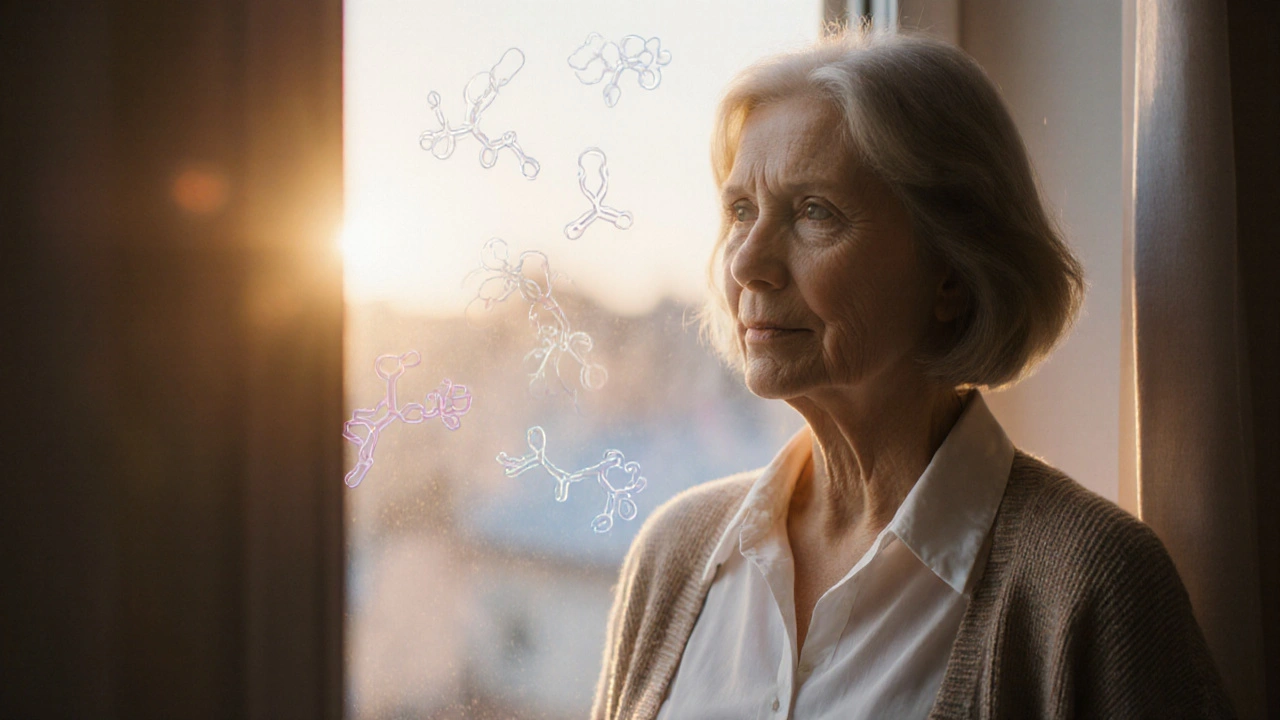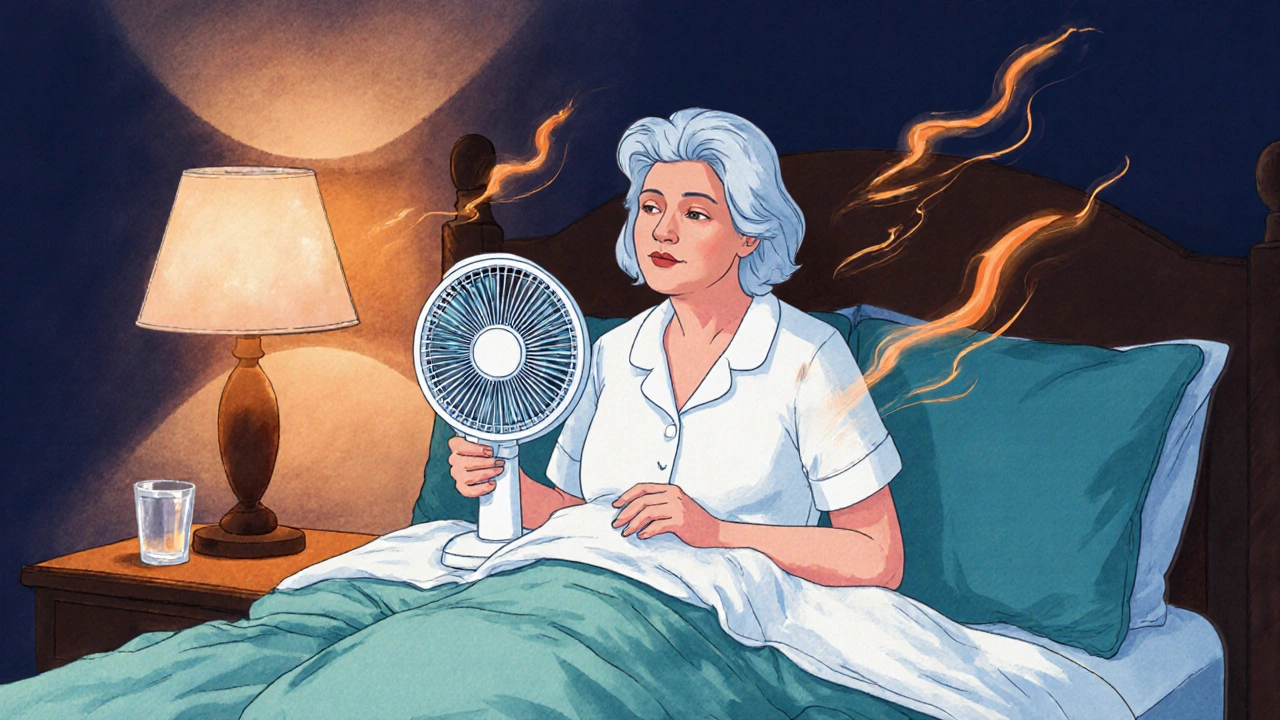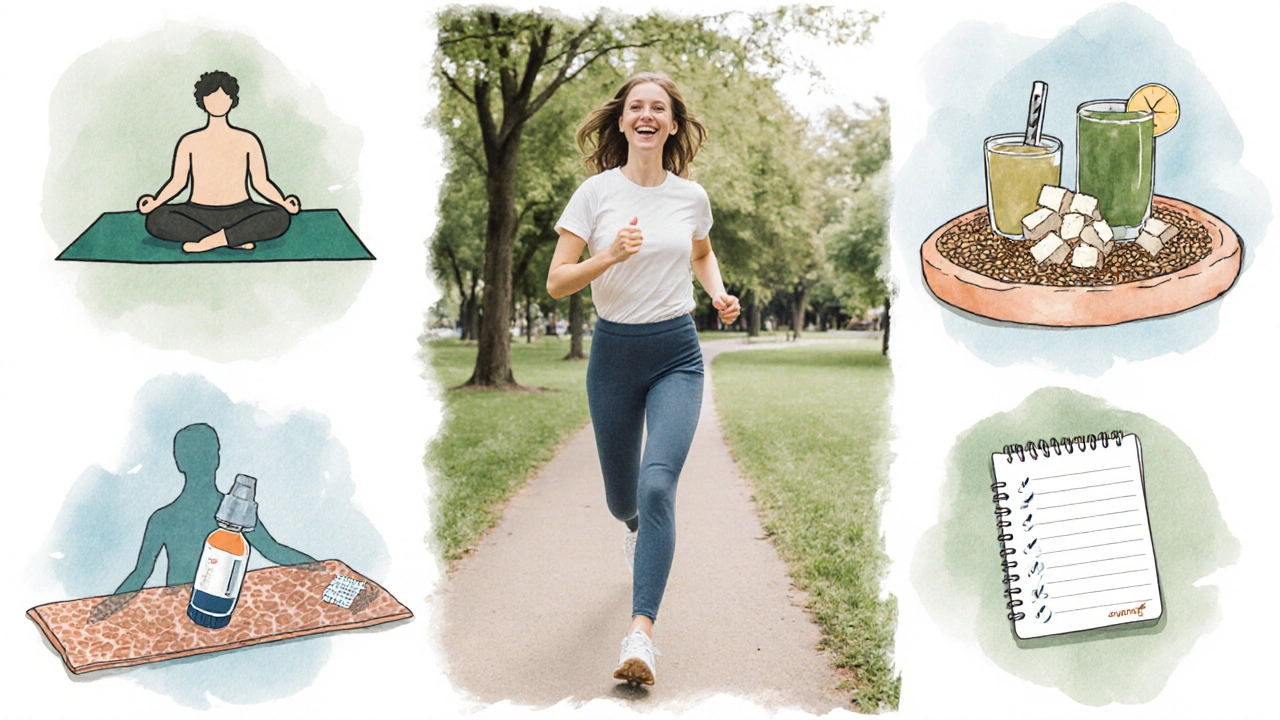Common Menopause Symptoms & Practical Management Tips

Oct, 10 2025
Menopause Symptom Checker
Select the symptoms you're experiencing to get personalized management tips.
Hot Flashes
Sudden waves of heat, sweating, and chills
Night Sweats
Hot flashes during sleep disrupting rest
Mood Changes
Irritability, anxiety, or depression
Vaginal Dryness
Itching, burning, or pain during intimacy
Sleep Disturbances
Insomnia, frequent awakenings, restless sleep
Other Symptoms
Fatigue, joint pain, memory issues
What you need to know about menopause symptoms
Women usually hit the menopause transition between their late 40s and early 50s, but the timing can vary widely. When estrogen levels start to fall, the body reacts in all kinds of ways. Understanding the most common menopause symptoms helps you plan ahead and stay in control.
Menopause is a natural, irreversible phase that marks the end of menstrual cycles. It is diagnosed after twelve consecutive months without a period. The hormonal shift triggers a cascade of physical and emotional signals that many women find uncomfortable.
Hot flashes - the classic warning sign
Hot flashes are sudden waves of heat that rise from the chest to the face, often followed by sweating and a chill. They can last from a few seconds to several minutes and may happen several times a day.
- Trigger: spicy foods, caffeine, alcohol, stress, warm environments.
- Frequency: 70‑80% of women experience them.
- Impact: Night‑time flashes disrupt sleep, leading to fatigue.
Managing hot flashes starts with lifestyle tweaks: dress in layers, keep a fan handy, and avoid known triggers. For many, low‑dose hormone therapy offers quick relief.
Night sweats - when the heat follows you to bed
Night sweats are essentially hot flashes that occur during sleep. The extra moisture can soak bedding and wake you up, creating a cycle of sleep loss.
Try these practical steps:
- Use breathable, moisture‑wicking pajamas made of cotton or bamboo.
- Set bedroom temperature around 18‑20°C (65‑68°F).
- Stay hydrated; a glass of cool water before bed can help regulate temperature.
If night sweats persist despite these changes, discuss with a clinician whether a prescription option is suitable.

Mood changes - the emotional roller‑coaster
Mood swings range from irritability and anxiety to low‑grade depression. Fluctuating estrogen can affect neurotransmitters like serotonin and dopamine.
Effective strategies include:
- Regular moderate exercise - releases endorphins and stabilises mood.
- Mindfulness meditation or deep‑breathing routines - helps lower cortisol.
- Social support - talking with friends or joining a menopause support group reduces isolation.
When mood symptoms become severe, cognitive‑behavioral therapy (CBT) has solid evidence for improving emotional wellbeing during menopause.
Vaginal dryness - a hidden source of discomfort
Vaginal dryness results from reduced estrogen that thins the vaginal lining. Women often report itching, burning, or painful intercourse.
First‑line options:
- Water‑based lubricants for immediate relief.
- Vaginal estrogen creams or tablets - low systemic absorption, high local effect.
- Over‑the‑counter moisturisers applied a few times a week.
Non‑hormonal alternatives such as phytoestrogens (soy, flaxseed) may provide modest improvement, though clinical data are mixed.
Sleep disturbances - the silent fatigue driver
Insomnia, frequent awakenings, and restless sleep are reported by up to 60% of women in the menopausal transition. The culprits are often hot flashes, night sweats, and anxiety.
Adopt a sleep‑friendly routine:
- Maintain a consistent bedtime and wake‑time, even on weekends.
- Avoid screens and bright lights at least an hour before bed.
- Incorporate a calming pre‑sleep ritual - gentle yoga, a warm (not hot) bath, or a short meditation.
If lifestyle changes fall short, magnesium supplements or a low dose of melatonin can be tried under medical guidance.

Hormone therapy - the gold standard for many symptoms
Hormone therapy (HT) replaces estrogen (with or without progesterone) to smooth the hormonal dip. It is the most effective single treatment for hot flashes, night sweats, and vaginal atrophy.
Key points to weigh:
- Age and time since menopause onset - benefits outweigh risks if started before age 60 or within 10 years of menopause.
- Personal risk profile - history of breast cancer, blood clots, or liver disease may contraindicate HT.
- Delivery method - pills, patches, gels, or vaginal rings; transdermal options lower clot risk.
Always have a thorough discussion with a healthcare provider to customise dose and duration.
Non‑hormonal options - lifestyle, nutrition, and mind‑body tools
When HT isn’t an option, a blend of natural strategies can ease most symptoms.
| Aspect | Hormone Therapy | Non‑Hormonal |
|---|---|---|
| Effectiveness for hot flashes | 80‑90% reduction | 30‑50% with lifestyle + phytoestrogens |
| Impact on bone density | Prevents loss | Weight‑bearing exercise helps |
| Risk profile | Potential clot, breast cancer risk | Generally low; watch for herbal interactions |
| Typical cost per month (USD) | $30‑$80 | $0‑$20 (diet, exercise) |
Core non‑hormonal tools include:
- Exercise - Aim for 150 minutes of moderate aerobic activity weekly; add strength training twice a week to protect bone health.
- Balanced diet rich in calcium (1,200mg) and vitaminD (800‑1,000IU).
- Phytoestrogen‑rich foods: soy tofu, tempeh, flaxseed (1tablespoon ground daily).
- Mindfulness‑based stress reduction (MBSR) - 8‑week programs lower hot‑flash frequency by ~25% in clinical trials.
- CBT for sleep and mood - improves insomnia scores without medication.
Quick‑action checklist for day‑to‑day relief
- Carry a portable fan or cool pack for unexpected hot flashes.
- Keep a water bottle handy; sip regularly.
- Schedule 30 minutes of brisk walking or swimming most days.
- Add a tablespoon of ground flaxseed to morning smoothies.
- Use a silicone‑based lubricant before intimacy; reapply as needed.
- Write down sleep triggers each night; adjust environment accordingly.
- Talk to a clinician about a personalized hormone‑therapy trial if symptoms severely impact quality of life.
Frequently Asked Questions
How long do menopause symptoms usually last?
The most intense phase, called perimenopause, typically spans 4‑5 years. Some symptoms, especially hot flashes, may continue for up to 10 years, but they often fade gradually after that.
Is hormone therapy safe for everyone?
No. Women with a history of estrogen‑dependent breast cancer, blood clots, liver disease, or uncontrolled hypertension should avoid systemic HT. Transdermal patches may be safer for some, but a doctor’s assessment is essential.
Can diet alone eliminate hot flashes?
Diet helps, but it rarely eliminates flashes completely. Incorporating phytoestrogens, staying hydrated, and limiting caffeine/alcohol can cut the frequency and severity, especially when combined with other lifestyle changes.
What’s the best sleep position for night sweats?
Sleep on your back with a lightweight, breathable sheet set. Keeping a pillow between the knees can improve spinal alignment and reduce tossing.
Are over‑the‑counter supplements like black cohosh effective?
Evidence is mixed. Some women report relief from hot flashes, while large meta‑analyses find no statistically significant benefit. If you try them, monitor for liver issues and discuss with a healthcare professional.
